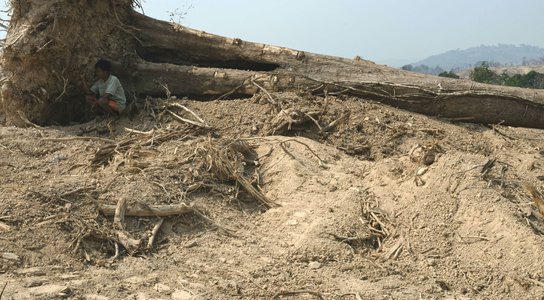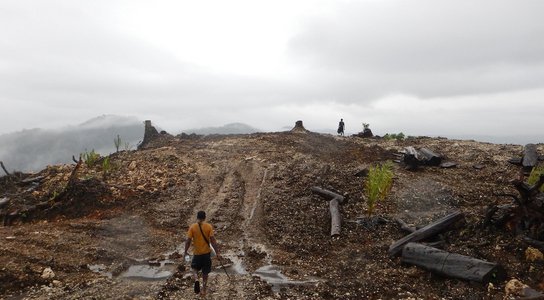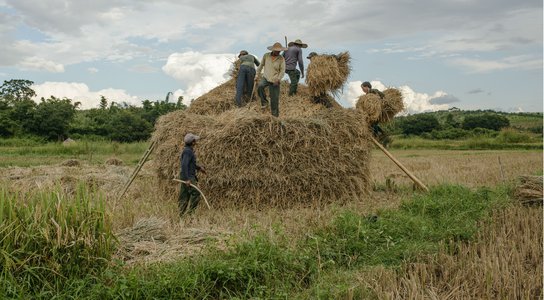New Chinese rubber industry guidelines could play a key role in tackling land grabs and deforestation across the Mekong according to non-governmental group Global Witness. The guidelines, launched today at an intergovernmental conference in Ho Chi Minh City, Vietnam, are the most progressive yet in addressing the social and environmental risks for companies associated with large-scale rubber plantations around the world.
Ali Hines, of the Global Witness Land team said: “The guidelines come at a crucial moment for the rubber industry. The last decade has seen unscrupulous companies rapidly forcing people from their land and destroying primary forests in their wake as they expand operations. But the industry needn’t become tainted by these risks. As one of the top consumers and producers of natural rubber, Chinese industry can demonstrate real leadership in recognising and reducing supply chain risks, protecting forests and the rights of indigenous communities, as set out in the new guidelines.”
The Chinese Guidelines for Sustainable Development of Natural Rubber1 have been launched by the Chinese Chamber of Commerce of Metals, Minerals and Chemicals Importers and Exporters (CCCMC), which is supervised by the Ministry of Commerce.
The guidelines were drafted in association with international and Chinese partners, including Global Witness, following a four year-long drafting process including a public consultation.
Hines added: “The guidelines must be adopted by companies if they are to have any real impact. Unless they implement them, companies risk lagging behind strong emerging industry standards.”
Global Witness investigations have exposed the considerable environmental, social and financial risks associated with the continued expansion in global demand for natural rubber. Our exposés of rubber giants Hoang Anh Gia Lai and the Vietnam Rubber Group highlight consequences companies face when they do not undertake adequate checks to ensure that plantations allocated by governments are in line with the law.
The rubber industry has seen key consumers of natural rubber introduce sourcing policies for sustainable rubber over the last two years marking a major shift in the largely unregulated industry.2 In addition company executives could now be held criminally responsible under international law for crimes linked to land grabbing and environmental destruction, following developments under the International Criminal Court.3
Global Witness is encouraging communities across South East Asia to monitor rubber company operations and use the CCCMC guidelines in their engagement with firms.
Hines said: “CCCMC are to be congratulated for their guidelines which represent a significant step towards eliminating land grabs and deforestation from company supply chains. What is crucial now is that Chinese rubber companies rigorously implement the standards and inspire other companies to do the same.”
Resources
/ ENDS
Contacts
Notes to editor:
1. Key elements of the guidelines include:
- Respecting and protecting
local communities rights related to land and other natural resources. This
includes Indigenous Peoples’ right to Free, Prior and Informed Consent;
- Carrying out
comprehensive Environmental and Social Impact Assessments to ensure that
harmful impacts are mitigated against;
- Adopting of
‘Zero-Deforestation’ policy in order to protect biodiversity and intact
forests;
- Establishing community
grievance mechanisms and ensuring that communities are fully compensated for
loss of resources.
2. Tire giant Michelin launched its new Sustainable Natural Rubber Sourcing Policy in 2016 which commits the company to zero-deforestation and the protection of land rights in all its operations. The company aims to map 100% of its suppliers to ensure full traceability of its supply chain. Companies, including those based in China, failing to adopt the new guidelines, risk losing business from major international players.
3. A recent move by the
Prosecutor of the International Criminal Court (ICC) to expand its focus
signals a landmark shift in international criminal justice; in Cambodia land
grabbing has happened at such scale and so systematically that the ICC is
considering investigating it as a crime against humanity. Company executives
could now be held criminally responsible under international law for crimes
linked to land grabbing and environmental destruction. Rubber is one of the
key drivers of land grabbing in countries like Cambodia.
You might also like
-
Report Rubber Barons
Vietnam’s two biggest rubber companies are moving into Cambodia and Laos, seizing farmland, flouting land and forest protection laws and wrecking local livelihoods.
-
Press release Company executives could now be tried for land grabs and environmental destruction
Historic announcement from International Criminal Court Prosecutor is critical first step in crackdown on violence and theft in global trade in land and natural resources
-
Report Guns, Cronies and Crops
New Global Witness exposé: how Myanmar’s business, political and military cronies conspired to grab farmers’ land, leaving communities struggling to survive.